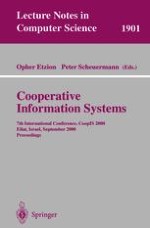Cooperation among systems has gained substantial importance in recent years: electronic commerce virtual enterprises and the middleware paradigm are just some examples in this area. CoopIS is a multi-disciplinary conference, which deals with all aspects of cooperation. The relevant disciplines are: collaborative work, distributed databases, distributed computing, electronic commerce, human-computer interaction, multi-agent systems, information retrieval, and workflow systems. The CoopIS series provides a forum for well-known researchers who are drawn by the stature and the tradition of these conference series and has a leading role in shaping the future of the cooperative information systems area. CoopIS 2000 is the seventh conference in the series and the fifth conference organized by the International Foundation on Cooperative Information Systems (IFCIS). It is sponsored by the IFCIS, the IBM Research Laboratory in Haifa and Compaq, Tandem labs Israel. It replaces the former international workshops on Interoperability in Multidatabase systems (IMS) and the conference series on Cooperative Information Systems (CoopIS & ICICIS). In response to the call for papers 74 papers were submitted. Each of them was reviewed by at least three reviewers, and at the end of this process 24 papers were accepted for presentation at the conference. Six additional papers were selected for short presentations. In addition the conference includes two panels, two keynote speakers (Professor Calton Pu from Georgia Tech and Professor Sheizaf Rafaeli from Haifa University) and one tutorial. A special issue of the International Journal of Cooperative Information Systems will follow. August 2000 Opher Etzion & Peter Scheuermann
